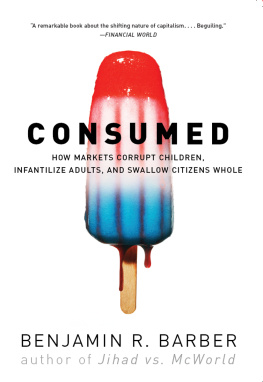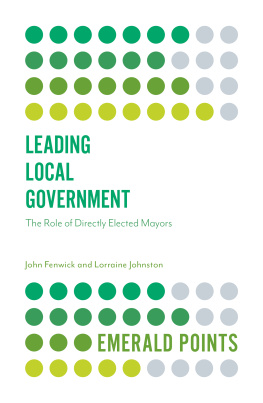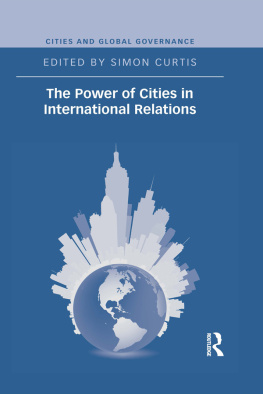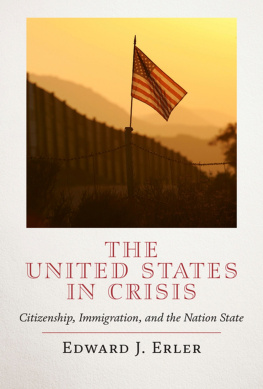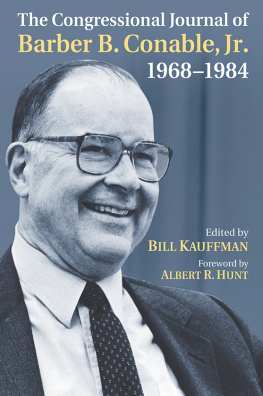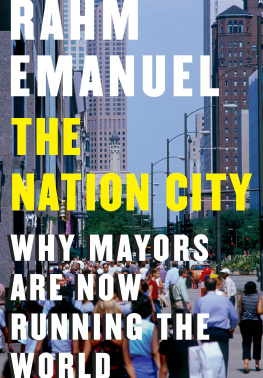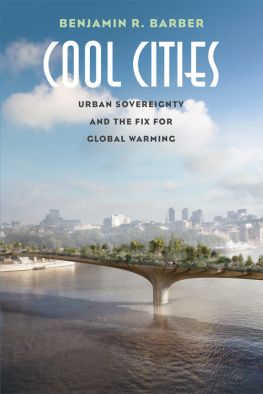IF MAYORS RULED THE WORLD
ALSO BY BENJAMIN R. BARBER
Consumed (2007)
Fears Empire (2003)
The Truth of Power (2001)
A Place for Us (1998)
A Passion for Democracy: American Essays (1998)
Jihad vs. McWorld (1995)
An Aristocracy of Everyone (1992)
The Conquest of Politics (1988)
Strong Democracy (1984)
Marriage Voices (A Novel) (1981)
Liberating Feminism (1975)
The Death of Communal Liberty (1974)
Superman and Common Men (1971)
IN COLLABORATION
The Struggle for Democracy
with Patrick Watson (1989)
The Artist and Political Vision
edited with M. McGrath (1982)
Totalitarianism in Perspective
with C. J. Friedrich and M. Curtis (1969)
BENJAMIN R. BARBER
IF MAYORS RULED THE WORLD
Dysfunctional Nations, Rising Cities

Copyright 2013 by Benjamin R. Barber.
All rights reserved.
This book may not be reproduced, in whole or in part, including illustrations, in any form (beyond that copying permitted by Sections 107 and 108 of the U.S. Copyright Law and except by reviewers for the public press), without written permission from the publishers.
Yale University Press books may be purchased in quantity for educational, business, or promotional use. For information, please e-mail sales.press@yale.edu (U.S. office) or sales@yaleup.co.uk (U.K. office).
Designed by Lindsey Voskowsky.
Set in Adobe Caslon type by Westchester Publishing Services.
Printed in the United States of America.
Library of Congress Cataloging-in-Publication Data
Barber, Benjamin R.
If mayors ruled the world : dysfunctional nations, rising cities / Benjamin R. Barber.
pages cm.
Includes bibliographical references and index.
ISBN 978-0-300-16467-1 (hardback)
1. MayorsCase studies. 2. Municipal government. 3. Leadership. 4. Comparative government. I. Title.
JS141.B37 2013
320.85dc23
2013016680
A catalogue record for this book is available from the British Library.
This paper meets the requirements of ANSI/NISO Z39.48-1992 (Permanence of Paper).
10 9 8 7 6 5 4 3 2 1
To our cosmopolitan mayors everywhere, who take responsibility for a world they have not been given the full power to govern and whoinsisting on solving rather than debating problemshave allowed us to step away from the precipice
And in particular to these mayors past and present whom I have been lucky enough to know, a representative few whose glocal leadership in their cities has been my inspiration:
Mayor Pawe Adamowicz of Gdansk
Deputy Mayor Aileen Adams of Los Angeles
Mayor Michael Bloomberg of New York
Mayor Rafa Dutkiewicz of Wrocaw
Mayor John Hickenlooper of Denver
Mayor Yury Luzhkov of Moscow
Mayor Antanas Mockus of Bogot
Mayor Leoluca Orlando of Palermo
Mayor Park Won-soon of Seoul
Mayor Olaf Scholz of Hamburg
Mayor Wolfgang Schuster of Stuttgart
Mayor/President Tony Tan of Singapore
Mayor Walter Veltroni of Rome
Mayor George Kaminis of Athens
The local is the only universal, and as near an absolute as exists.
John Dewey, The Public and Its Problems
The 19th century was a century of empires, the 20th century was a century of nation states. The 21st century will be a century of cities.
Wellington E. Web, the former mayor of Denver
Look, Ill fix your sewers if you knock off the sermons.
Jerusalem Mayor Teddy Kollek
CONTENTS
ACKNOWLEDGMENTS
This book builds on an encompassing corpus of work undertaken earlier by a host of scholars who, knowing the urban field far better than I ever will, have made the city their subject and sometimes their lifework. Much of what I do here is merely to hold up a megaphone before them so that their measured and persistent voices on behalf of the redemptive potential of the urban can be widely heard. Tom Bender, Manuel Castells, Eric Corijn, Mike Davis, Richard Florida, Edward Glaeser, David Harvey, Peter Marcuse, Saskia Sassen, Richard Sennett, and Ronald van Kempenand before them Lewis Mumford, Max Weber, Jane Jacobs, and the many others who are cited belowhave built a scholarly edifice I feel lucky to have been able to inhabit and explore. My task has been to apply the results of their work to the challenge of establishing a form of constructive interdependenceglobal democratic governancein which cities are prime actors.
Like all authors and scholars, I have benefited enormously from myriad others in conceiving and executing this project. Three research associates who worked with me on various stages of the manuscript have made especially important contributions: Patrick Inglis, who helped with research and thinking about the project at the outset, when my focus was just beginning to move from global governance to global cities, and whose own work on India and the urban is so important; Deirdra Stockmann, who was a research associate during the writing of the first half of the book, where her research on networks and inequality proved so valuable; and Daniel London (below). Though not involved directly in research, my former executive assistant and coordinator of programs for CivWorld, Harry Merritt (now returned to graduate school in history to pursue his own scholarly interests), has been a presence throughout the writing of this book, and I owe him much for his curiosity and contributions.
Daniel London, who has worked on research for the manuscript throughout and was a principal creator and overseer of the books website, has been much more than a research assistant. He has been a careful editor, an exacting compiler of charts and data, and a valuable contributor of ideas. Daniel also spent time as the research coordinator for my CivWorld team at the Graduate Center of the City University of New York. His role in this project has been major.
I have also been the beneficiary of relationships to former students (now colleagues) including SungMoon Kim, with whom I wrote an essay on a new interdependence paradigm for global governance several years ago that was one platform for the ideas here, and whose own work on civil society East and West is so important; and Stuart MacNiven, whose research on Rousseau and love of political theory in combination with his friendship have been a continuing inspiration. Trevor Norris, in his capacity as editor of a forthcoming Festschrift, has also taken a lively and contributory interest in this work.
A number of friends and colleagues, some of them also funders, have offered valuable support for my work leading up to and through this book. That support has helped my NGO CivWorld thrive and allowed me to develop its research side in crucial ways. The friendship and support of Sara McCune, whom I first met in the 1970s when I was editing the journal Political Theory at her then young Sage Publications, has been especially vital, along with the corollary support of her CEO, Blaise Simqu, with whom I worked decades ago when we were both young editors. Heinrich Thyssen has been a friend for many years and has shown repeatedly how business leaders can also be critical thinkers about interdependence. Thyssens support and that of his Nomis Research Foundation have facilitated my research and my interdependence work. Heine also introduced me to his colleague Jerre Stead, who offered vital support to my work at one key moment. Just recently, Liz Levitt Hirsch (of Levitt Pavilions) has become a friend and supporter of the Interdependence Movement and my own research, for which I am grateful. George Elvin, with his wife, Ginger, has long been a friend and backer of the Interdependence Movement, as well as a lively interlocutor on crucial issues of economics and politics. Finally, I have benefited enormously over the years from my relationship to the Kettering Foundation, whose civic agenda helps define my own. President David Mathews and Vice President and Program Director John Dedrick have offered sustaining support. With Dedrick, this commonality of purpose and generous support have been especially affecting because John was formerly a gifted Ph.D. student who worked with me at Rutgers University.
Next page

